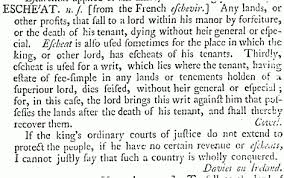escheat
英 [ɪs'tʃiːt; es-]
美 [ɪs'tʃit]
- n. 归还财产;充公
- vt. 归还;没收
- vi. 被没收;被征用
escheat 无主财产接收官员来自拉丁语excadere,来自ex-, 向外,-cad, 掉落。官职名,其主要职责是为国家统计并接收领土或辖地内的无主或无继承人的财产,因这一职务油水丰厚,所以担任这一官职者通常背负着欺骗的坏名声。常见词cheat即来自该词拼写变体。
- escheat (n.)
- the reverting of land to a king or lord in certain cases, early 14c., from Anglo-French eschete (late 13c.), Old French eschete "succession, inheritance," literally "that which falls to one," noun use of fem. past participle of escheoir "happen, befall, occur, take place; fall due; lapse (legally)," from Late Latin *excadere "to fall out," from Latin ex- "out, away" (see ex-) + cadere "to fall" (see case (n.1)). As a verb, from late 14c. Related: Escheated; escheating. Late Latin *excadere represents a restored form of excidere, which yielded excise.
- 1. The dormant account reverted to the state under escheat laws.
- 根据充公法律规定,休眠账户归国家所有.
来自互联网
- 2. The lord lost his claims to escheat.
- 土地领主失去了归还土地的请求权.
来自互联网
[ escheat 造句 ]
